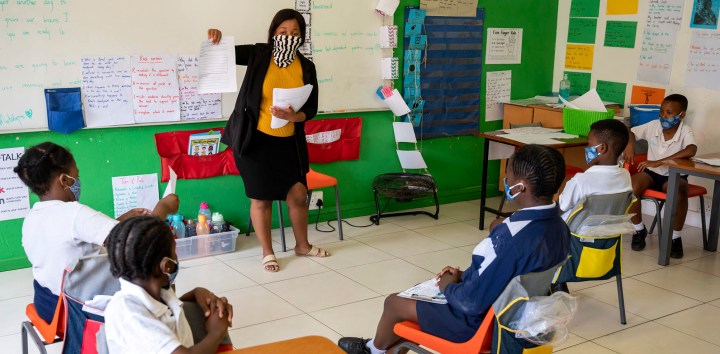BUSINESS MAVERICK 168
Hey, China, we’ve got teachers for Africa

As jobs in the formal economy have slowed, people have turned online to look for new opportunities. Teaching English is one popular option – especially for older workers whose careers have collapsed.
First published in the Daily Maverick 168 weekly newspaper.
When opportunities for freelance journalists evaporated during the Covid-19 lockdown, I had a genius idea: I took an online qualification in Teaching English as a Foreign Language (TEFL) to attempt a new career.
With billions of people around the world eager to learn my language, I was hardly alone. Teaching English has morphed from being a gap-year filler for youngsters to the promise of salvation for older workers whose careers collapsed in the global pandemic.
The Ireland-based TEFL Academy, which I studied with, welcomed an 11% rise in students last year. The biggest increase came from people over 55, where the intake more than doubled.
“Teaching online is something that’s very doable for that age bracket and it’s seeing the biggest growth, which I’m absolutely delighted with because they’re bringing a level of maturity to the market which is quite exciting. I like to think it will raise the level of professionalism,” says Tom Gibbons, marketing director of the TEFL Academy.
Although the number of trainee teachers has soared, it’s been outstripped by the demand for online lessons, he believes.
The British Council estimates that two billion people were learning English in 2020, with 300 million of those in China.
Since the lockdowns aimed at curbing the spread of Covid-19, many schools have replaced physical classes with online teaching, creating many new jobs.
The language schools stream lessons from teachers overseas, using an ecosystem of online learning providers who recruit teachers from around the world. Other sites act as a platform for freelancers to advertise themselves and find pupils for private lessons.
“A lot of the online platforms have thousands of teachers but they’re looking for more,” says Gibbons. “Almost overnight there was a huge demand for TEFL teachers and business was being turned away because there weren’t enough tutors. The market is there to be taught. If you’ve lost your job and you have the time then why shouldn’t you do it? You’ll have it for life as a safety net you can always fall back on.”
While the TEFL Academy saw its trainee teachers numbers rise globally last year, its new recruits in South Africa fell by 9%. Gibbons thinks that’s because South Africans usually earn the qualification so they can work abroad, and online teaching doesn’t appeal to them.
Or perhaps cash-strapped South Africans are taking cheaper courses from rival institutes. The price of TEFL courses range from R1,100 to R14,000, and from 120 hours of training to 300 hours, including some practical experience. But the cheaper courses may not be approved by any regulatory bodies, giving you a qualification that isn’t respected by recruiters, Gibbons warns.
For new and inexperienced teachers, getting a job or winning private students can be tough. As well as a TEFL certificate, schools in many countries require you to hold a fouryear degree in any subject. Eskom’s practice of load shedding doesn’t help either, sending teachers into a panic when they have lessons scheduled.
It can also be for menial pay.
Private tutor site Preply features many South African teachers, like Shalia in Durban, who’s studying for a degree in supply chain management and has taught more than 2,000 lessons. Or Kim, who speaks four languages and has owned restaurants, been a tour guide and worked in architecture.
Some charge as little as $8 (R121) an hour, with Preply keeping 100% of their first lesson fee with each new student, then taking a commission of 18% to 33%, with the rate reducing as you work more hours. Paypal also takes a cut for processing the payment, and the banks will inevitably cream off an international handling fee too.
“It’s flirting with minimum wage, but they scale up fairly quickly depending on your attendance and work ethic,” says Gibbons. “You’ll get to better wages once you prove you’re going to turn up.”
It’s not only the potentially poor pay that can be a disappointment, says a lecturer and professional trainer in the tourism trade who qualified in TEFL last year to augment her income. She asked not to be named in case it dents her formal career. She now works three days a week for a Chinese school and earns a good salary because her experience allows her to charge more.
“But my story isn’t the story that 99% of people who have done TEFL will tell you. They’re saying the market is saturated,” she says.
The lockdowns saw a lot of people who aren’t natural teachers enter the field, seeking a new career, or a side gig to supplement lost working hours or salary reductions.
“The TEFL candidate now isn’t the same as before. People are stuck at home so they’re looking for something else to do with the resources they have. But TEFL isn’t easy if you don’t have any teaching experience, and some recruiters don’t accept South Africans at all because of the accent. I’ve seen people really struggle, saying they’ve applied for 20, 30 or 50 jobs or they’ve given up.”
The course itself is difficult, with assignments testing your knowledge of English grammar and your ability to create engaging lesson plans. Even as a native speaking journalist, I was scoring 64% in the assignments because there’s a huge difference between using English and teaching it to people with no prior understanding of the language.
Clarissa Botha runs the Bloemfontein franchise of OVC, a company that offers TEFL training and places job-hunters overseas. She took a TEFL course last year and applied to 27 online schools before she got her first interview, and got the job.
“At the beginning of lockdown, we had a lot of enquiries from people who had been retrenched. The market is a bit saturated now because with Covid everybody is trying to work online,” she says. “You absolutely have to have the kind of personality to sit all day and apply to hundreds of schools and continue to apply even though you get rejected endless times. The worst I heard of was someone applying for 54 jobs.”
Those who succeed typically earn R5,000 to R20,000 a month depending on how many hours they work, says Botha. For freelance teachers working through the online platforms, anything over $20 (around R300) is very good, but it takes more effort because you have to find your own students and design your own material, instead of using a school’s existing lesson plans.
Afrikaans journalist Karla Janse van Vuuren had just had a baby when she was retrenched from Beeld last year. She took a TEFL course during lockdown to fill the gap. “I hope I never need it, but once you have it, you have it,” she says.
Her sister also qualified, so both are now seeking online teaching posts. “There are a lot of opportunities being advertised, and my sister has had two interviews with schools in Poland and Romania. But she hasn’t got anything yet and she’s been looking for longer than me, so it seems like it could take a while to find a job,” she says.
Since Van Vuuren has no teaching experience she wants to work for a school that provides a set curriculum, lesson material and support. “I definitely want some structure behind me like lesson plans,” she says. “It’s a brave new world and I don’t want to feel like I’m completely on my own.” DM168
This story first appeared in our weekly Daily Maverick 168 newspaper which is available for free to Pick n Pay Smart Shoppers at these Pick n Pay stores.




















 Become an Insider
Become an Insider
Comments - Please login in order to comment.